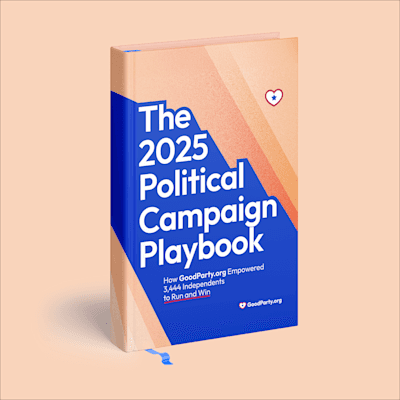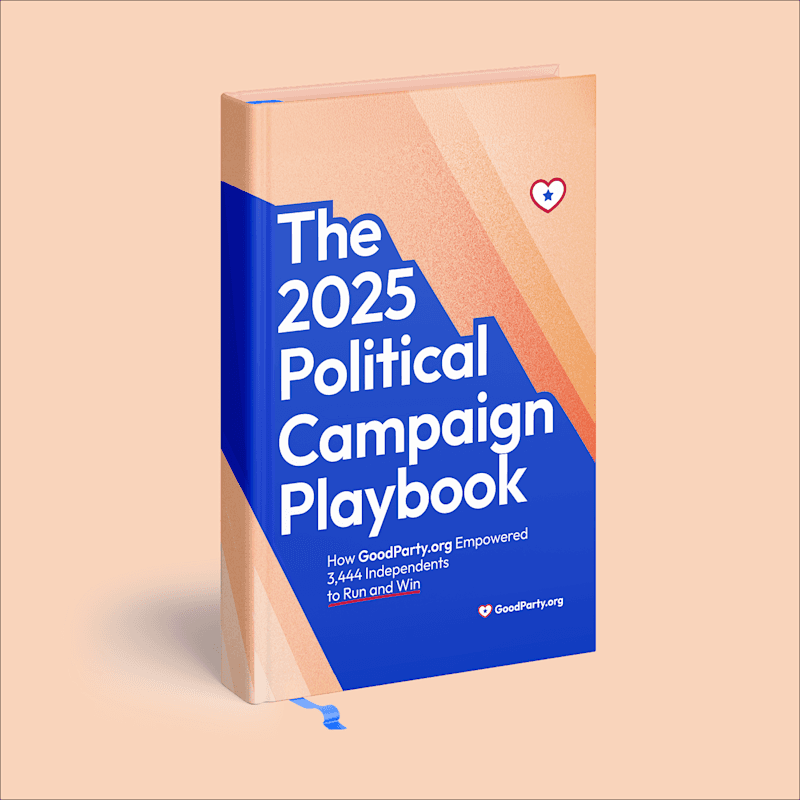What Are Independent Expenditures?
In today’s political landscape, transparency and accountability are essential. Even if you’re a seasoned political candidate, the nuances of campaign finance can be tricky to navigate. Not understanding the rules and regulations of political donations can lead to legal and ethical problems.
For these reasons, it’s also important for potential donors and voters to know what is and is not allowed in campaign finance.
One facet of campaign finance that raises questions and concerns is independent expenditures. What are independent expenditures, who makes them, and how do they impact political campaigns?
The Role of Money and Independent Expenditures in Politics
For good or bad, money plays an important role in politics. Running a competitive campaign can take a lot of cash, and the level of available funding influences everything from campaign strategies to voter outreach. Campaigns must cover travel, salaries, and the cost of advertising, and that’s just the basics.
While direct contributions to campaigns are a well-known — and necessary — aspect of political funding, the rise of Super PACS gives the concept of independent expenditures increasing significance.
What are Independent Expenditures?
Independent expenditures are funds that are spent by individuals, groups, or organizations to advocate for or against political candidates without directly coordinating with a candidate’s campaign. For example, you might see a negative ad about a candidate running for governor with a legal notice saying “Paid for by Citizens Against So-and-So,” meaning that it was funded by an outside group that’s not affiliated with a political campaign.
Ads created in coordination with a political campaign would state that the message is approved or endorsed by the candidate they’re meant to help.
Donors who fund independent expenditures have a vested interest — whether it’s a piece of legislation or a favorable policy — in getting a specific candidate elected. So, they put their money into campaign materials that are meant to convince voters to support their candidate or steer voters away from the opposition.
Unlike direct campaign contributions, which go directly to a candidate's campaign, independent expenditures are made without any input or involvement from a political campaign. These groups can be classified as primarily formed recipient committees, which are dedicated to advocating for or against a specific candidate or policy, or general-purpose recipient committees, which benefit multiple candidates or proposals.
It’s this independence that sets independent expenditure committees apart from donors and grants them certain freedoms under the law.
Who Can Make Independent Expenditures?
Almost anyone can make independent expenditures, including individuals, corporations, labor unions, and political action committees (PACs). The key requirement is that these expenditures must not be coordinated with any candidate or their campaign.
There are no limits on how much a donor can contribute to independent expenditures, but the funds are subject to certain reporting requirements. The lack of coordination with a political campaign is what legally distinguishes independent expenditures from direct campaign contributions. Even making a phone call to someone affiliated with a campaign about the expenditure can change the nature of the donation or reporting requirements.
What Campaign Activities Do Independent Expenditures Fund?
Independent expenditures fund a broad range of campaign activities that are aimed at influencing voter opinions and election outcomes.
Common examples include:
Advertising: Television, radio, online, and print ads advocating for or against a candidate.
Mailers and Campaign Literature: Brochures, flyers, and direct mail campaigns targeting specific voter demographics.
Social Media Campaigns: Paid promotions and advertisements on social media platforms.
Events and Rallies: Organizing events to support or oppose a candidate's platform.
These activities are designed to sway public opinion, and they can have a significant impact on elections.
Independent Expenditures vs. Campaign Contributions
The difference between independent expenditures and direct contributions is related to the influence of soft money vs. hard money. For legal and ethical reasons, understanding the difference between the two types of financial electioneering is crucial:
Campaign Contributions are funds given directly to a candidate's campaign. They are subject to strict limits and regulations, and candidates must disclose all of their donors and funding sources.
Independent Expenditures are funds spent independently to support or oppose a candidate. They are not subject to the same contribution limits, but must not be coordinated with the candidate's campaign in any way.
While both types of funding aim to influence elections, the key distinction lies in coordination, disclosure, and regulation.
The History of Independent Expenditures
Independent expenditures have a long history in American politics, but their role has evolved significantly over time. The Federal Election Campaign Act (FECA) of 1971 introduced regulations aimed at increasing transparency and limiting the influence of money in politics.
Prior to that, campaign finance laws were less stringent. They enabled greater influence by wealthy individuals and organizations, and it was often difficult to know exactly where the money was coming from in many cases.
However, subsequent court rulings, including the landmark Buckley v. Valeo decision in 1976, determined that the right to make independent expenditures was a form of free speech. This ruling laid the groundwork for the current landscape of independent expenditures in political campaigns.
The Impact of Citizens United v. FEC
The 2010 Supreme Court decision in Citizens United v. The Federal Election Commission was a pivotal moment in the history of campaign finance. This ruling held that corporate funding of independent political broadcasts in candidate elections cannot be limited under the First Amendment. The decision effectively allowed corporations and unions to spend unlimited amounts on independent expenditures, leading to a surge in political spending.
The Increasing Influence of Super PACs
In the wake of Citizens United, Super PACs (also known as independent expenditure-only committees) emerged as powerful players in the political arena. Unlike traditional PACs, Super PACs can raise and spend unlimited amounts of money to advocate for or against political candidates, provided they do not coordinate directly with the candidates' campaigns.
According to data compiled by OpenSecrets, Super PACs have raised billions of dollars in recent election cycles. As a result, this dramatically increased their influence on elections. As of August 8, 2024, 2,257 Super PACs have reported $588,360,089 in total independent expenditures, all during the 2021 - 2022 election cycle alone.
The increasing influence of Super PACs on candidates and voters means that wealthy individuals and organizations have more sway in who wins elections and how their legislative agendas play out. For many voters, this is a major cause for concern, as power continues to shift away from the average voter and into the hands of more powerful elites.
What Candidates Should Know About Independent Expenditures
For political candidates, understanding the implications of independent expenditures is essential.
When groups or individuals can spend virtually unlimited sums of money to influence elections, it means that:
Candidates don't control the messaging or strategies employed by groups making independent expenditures on their behalf.
Independent groups could spread information that's not approved or endorsed by the candidate, leading to potential conflicts.
Candidates could face increased scrutiny and ethical questions if large sums of money are spent by outside groups supporting their campaign.
Disclosure Requirements and Regulations
While independent expenditures are not subject to the same contribution limits as direct campaign contributions, they’re still subject to disclosure requirements.
Key regulations include:
Filing Reports: Individuals and groups making independent expenditures must file reports with the Federal Election Commission (FEC), disclosing the amounts spent and the purposes of the expenditures.
Identifying Sponsors: Political advertisements funded by independent expenditures must clearly identify their sponsors to ensure transparency.
These requirements are meant to prevent corruption and inform voters about who is funding political advocacy.
Ethical Considerations
Because of the enormous amounts of money involved, the looser regulatory oversight, and the level of influence they can have, independent expenditures raise significant ethical considerations for candidates. These include:
Decreased Transparency: While disclosure requirements exist, the sheer volume of independent spending can make it difficult for voters to follow the money in elections.
Potential for Corruption: Unlimited spending by corporations and wealthy individuals can lead to undue influence over political candidates and elected officials.
Impact on Democracy: The disproportionate influence of money in politics undermines the democratic process, leading to a system where financial power outweighs the will of the people.
Emphasizing grassroots support and small-dollar donations can help counterbalance the influence of independent expenditures, ensuring that the voices of everyday voters are heard through the noise.
Next Steps
Understanding independent expenditures is crucial for political candidates who want to run transparent, ethical campaigns. By being aware of the rules and regulations governing independent expenditures, candidates can better navigate this potential minefield and avoid pitfalls.
If you’re committed to promoting transparency and fighting corruption, check out GoodParty.org’s valuable resources and campaign tools designed to help independent candidates run clean, accountable campaigns.
As voters and candidates become more informed about the complexities of campaign finance, there’s hope for a more transparent and equitable political system that represents all Americans, not just the donor class.

